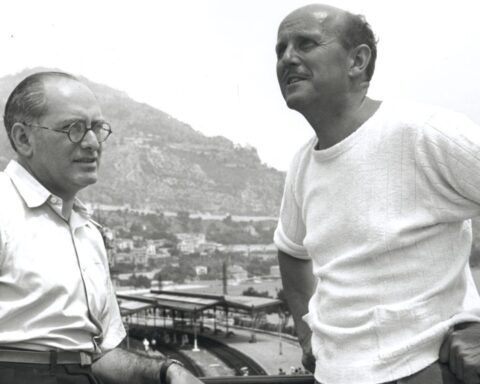Scotty and the Secret History of Hollywood
(USA, 98 min.)
Dir. Matt Tyrnauer
Programme: TIFF Docs (World Premiere)
It’s hard to divorce one’s opinion of subject Scotty Bowers from the documentary that shares his story. Bowers opens his little black book as he tells about his scandalous life as a Hollywood escort and pimp to the stars in Scotty and the Secret History of Hollywood. Matt Tyrnauer (Citizen Jane: Battle for the City) avoids making Bowers’ narrative one of tabloid trash, but the subject’s way of presenting his material is too problematic to endorse.
There is an undeniable element of novelty to this Hollywood insider’s portrait. Bowers is a good storyteller and a quirky character. (He’s a hoarder and a devoted cat person.) Bowers tells all about his career working a gas station in Tinseltown that catered to the secret sexual and romantic desires of the biggest stars. He offers scintillating stories about hooking up all sorts of A-listers with hot young men and women to please the stars behind closed doors. Following the release of his book Full Service, it lets Bowers crack the spine, name names, and provide sexual details about the stars that challenge their straight-laced images manufactured by the studios in the name of Hollywood morality.
As a reviewer or an audience member, it’s possible to object to Bowers’ decision to reveal all at the age of 90 without being a member of the moral police. One’s personal life is one’s personal life, and while Bowers certainly participated in many or all of the events chronicled in the film, these secrets are not his to reveal. Bowers insists that his decision to out famous stars is an act of humanizing celebrities. But that PR soundbite doesn’t hold when when the majority of his anecdotes are about the sexual preferences of celebrities told with a casual giggle. And really, who cares if celebrity X was gay?
Tyrnauer is aware of this conundrum and features a handful of objectors, including a hot debate of the book on the talk show The View in which Barbara Walters, Whoopi Goldberg, and Elisabeth Hasselbeck all dismiss Full Service as exploitative trash. Several characters in the film tell Bowers that it’s wrong to reveal personal information about people who are dead and cannot speak to the story themselves, especially since his relationship as a liaison between the stars and the hustlers was one of discretion. It’s hard to disagree with the characterization of Bowers as someone cashing in on the secrets of the dead.
Far more problematic, however, is the way Bowers presents his own secrets. One uncomfortable scene features Bowers recalling the early days of his sexual prowess, which leads to an account of a sexual relationship with his adult neighbour, who pleasured him when he was only 11. Tyrnauer interjects and asks Bowers if he realizes that the act he describes is child abuse. Bowers refutes the notion that his neighbour’s actions were molestation. Tyrnauer revives the question in a later interview and asks if his profession might be the result of a latent trauma, but Bowers simply waves it off. He portrays the act as a beautiful experience. While convention cautions filmmakers and viewers to avoid judging their subjects, Bowers’ characterizations of his childhood leave one uneasy.
Outside of the film’s central figure, Scotty and the Secret History expands to a larger study of Hollywood morality through conversations with talking heads including figures of the press and Hollywood biographers. Tyrnauer finds stronger material in the implications of Bowers’ bag of secrets as the documentary extends the conversation to the manufacturing of stars by the studios and how actors like Cary Grant, Katharine Hepburn, and Spencer Tracy compromised their personal lives for the escapist images we cherish. Similarly, a section on the Hays Code illustrates the institutionalization of sanitized and heteronormative relationships, which ultimately fed a conservative image of the ideal American to audiences. Scotty’s personal history might have best been kept a secret, but one appreciates Tyrnauer’s ability to open the story up to Hollywood’s own checkered past.
TIFF runs Sept. 7-17. Visit TIFF.net for more information.











